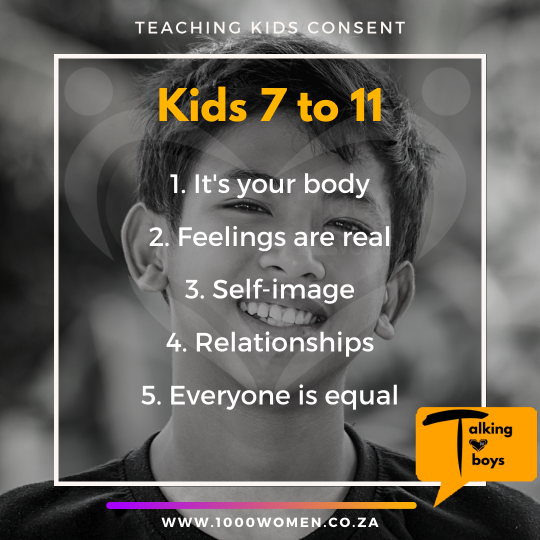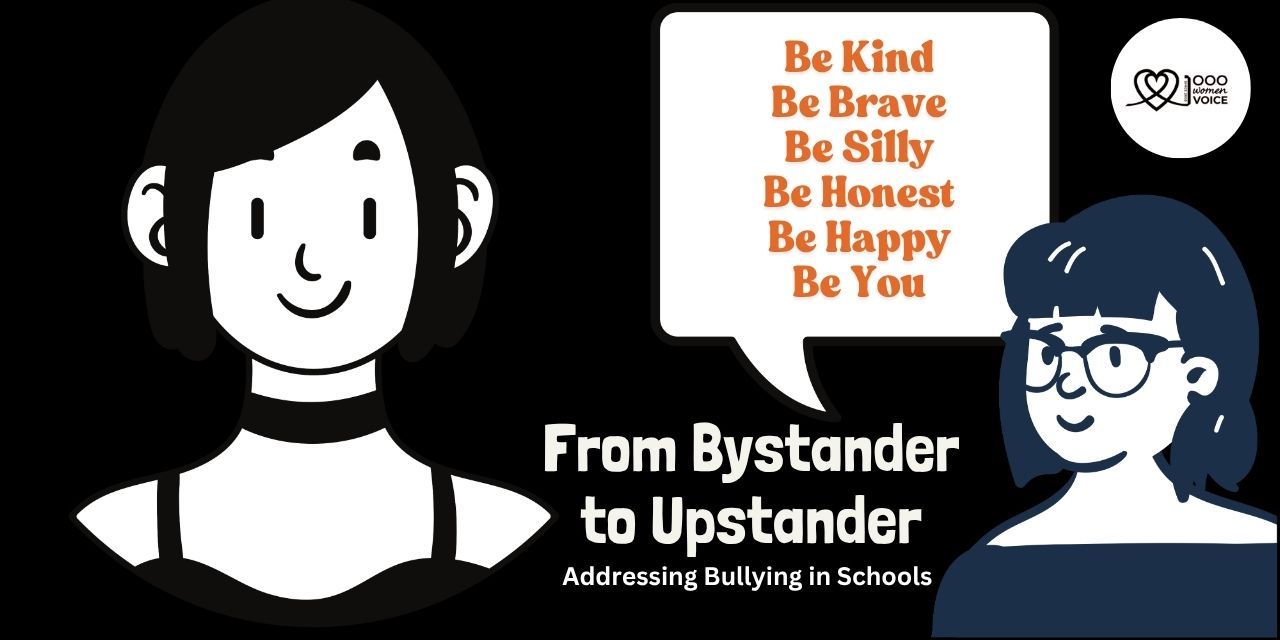Talking to Boys ages 7 to 11
Words Maret Lesch

Older Children Ages 7-11:
- Your body
- Talk about different body shapes and that every person’s body is worthy and perfect. It is okay if your body is different than those of your friends. Remind them to respect someone else’s body and not to make fun of other people.
- Encourage conversations where you as a parent explain how your child’s body is developing and growing. Treat these conversations light and welcoming, let your child understand that the change is something special, and not bad. Be honest about how these changes might make them feel. Create a safe space for them to talk about their feelings and uncertainties.
- Explain to your child how we must look after our bodies and take care of it through eating healthy, exercise, and daily hygiene.
- Remind your child that they can say “no” and “stop” and explain when to use these words. They must also listen when someone says “no” or ask them to “stop”.
- Explain to your child that it is okay to touch their own body but that it is important to do so when they are in private, for example in the bathroom or in their bedroom. Make sure they know that it is not okay when someone else touch their body like that.
Important: Explain that each body is different and that we don’t develop at the same time. Do not compare your body with someone else’s body. Respect your body and do not allow anyone to touch their body without their permission.
Don’t make constant jokes about your own or your child’s body. At this age, they are very sensitive and not yet mature enough to handle it.
- Feelings are real
- Explain that everyone is allowed to have feelings and help your child to explain how they are feeling in words. Remind them that it is okay to experience these feelings and that they are allowed to cry or talk about their feelings – especially boys.
- Your child might feel: scared, sad, confused, angry, happy, excited. Ask your child why they feel that way. Acknowledge their feelings and teach them they should be aware of others’ feelings as well.
- Explain that their friends have feelings too and that they must respect it. Teach them to be aware of their friends’ feelings and how they can support their friend. For example, they can ask their friend if they want to talk about their feelings.
- Remind them that having feelings and emotions are normal and that grown-up also experience different feelings.
- Equip them with the knowledge how to deal with their feelings. For example, if they are feeling angry, they can draw or write about their feelings in a special “feelings book”, kick or throw a ball, or ask to be alone for a few minutes. Do not punish them for feeling angry, rather help them to process and understand their feelings.
Important: Make time to listen to your child and talk about their feelings. Create a safe environment to talk about feelings and discuss different scenarios to illustrate how to handle the emotions they may feel. Use emojis or drawings to help them learn and understand all the different emotions they can experience.
- Self-image
- How your child feels about themselves will determine how they treat other people. You play a critical role in building your child’s self-image and the way they see themselves. Remind them that all people are different and that they are perfect the way they are. Teach them body acceptance and self-love and remind them that what they see on social media, do not portray real people and real life. Explain to them how they can take care of their body by exercising, eating healthy, and practising good hygiene.
- Help your child to feel useful and important by giving them responsibilities. Do this by assigning specific chores to them and thanking them when they have done it.
- Speak words of affirmation. Tell your child that they are loved, that you are proud of them, that you know they can do something. Praise them when they have completed a task or when they were brave enough to attempt something, even if it failed.
- Acknowledge your child. Listen to them and ask them for their opinion. Let them know that they have a voice and that you want to hear what they feel, say and think. Let them help make decisions, for example choose between two options for family dinner or choose a family activity. Praise them for their good choice.
- Make time to have conversations with your child. Listen for keywords when they are not feeling positive about themselves. Teach them how to deal with these feelings and show them that you believe in them. Accept who they are and do not try to change or improve them. Your child is their own, unique and wonderful person.
Important: Use positive words when reprimanding your child or speaking to them. For example, instead of saying “You should have tried harder”, rather say “I know you tried your best. I know you can do this, let’s try again?” Or “You keep making the same mistake”, you can say “Let’s see if there is another way of doing this”.
Allow younger children to develop their own style but remember to be the parent. Guide them when they look or smell bad – good hygiene does not come naturally!
- Relationships
- Explain that there are different types of relationships. Friendship and romantic relationships and that it means having different feelings. Talk to your child about realistic expectations. What they might have seen in movies or on social media do not portray real life.
- Don’t make fun of your child’s romantic feelings towards someone else. Encourage them to talk about their feelings and explain that feelings are not always mutual.
- Explain consent to your child. For example, if they want to hug someone, they must ask the other person first. Or if they want the other person to be their romantic friend, they must ask the other person first if that person feels the same way. Emphasise that they must accept the other person’s decision if they do not want to be friends or romantic friends.
- Talk to them about positive friendship and that friends care about each other. They do not say hurtful or negative things and do not make the other person feel uncomfortable. Talk to them about bullying, what it is, and what to do if they feel they are bullied.
- If your child asks questions about sex, answer honestly and as simple as possible. Do not volunteer more information than what they ask, but be honest and clear. Create a relationship where your child can ask you questions about anything without feeling embarrassed. Emphasise consent.
Important: If you suspect your child has a crush on someone or that someone may be romantically interested in them, look for opportunities to speak about relationships, but keep it light and use everyday examples in how we interact in a positive and caring manner with each other.
- Everyone is equal
- Allow your child to participate in sports, events, and opportunities they are interested in without labelling it as a girl or boy sport.
- Be mindful of words you use. For example, don’t use phrases like “boys don’t cry” or “you throw like a girl”.
- Teach them that their “no” is as powerful as a grown-up’s “no” and that they are allowed to say no when they do not feel comfortable.
- Explain that they have the right to an opinion, but it is important to be mindful of tone when speaking to others and that they must be considerate of others. Discuss scenarios and things that happened at school.
- Teach them that all people are equal, no matter your job, race, sexual orientation, gender, age, or where you stay. Lead by example by treating everyone with respect and care. Be mindful of how you talk to other people, including their friends, their parents and teachers, and of the things you say and the jokes you make or allow them to make. At this age the movies| YouTube you watch, and allow them to watch, is very important.
Important: Being equal also means that everyone must help at home. Assign chores evenly and thank your children when they have done their chores. Create an environment where genders are equal and are there to support each other.
Older siblings can get very jealous when their workload is much more than their younger brother or sister. Be mindful when assigning chores.
Make sure you are aware of the games they play, the YouTube channels or TikTok videos they watch and find funny. Laughing at a sexist prank with them, will send the wrong message and can rather be used as a learning opportunity.












